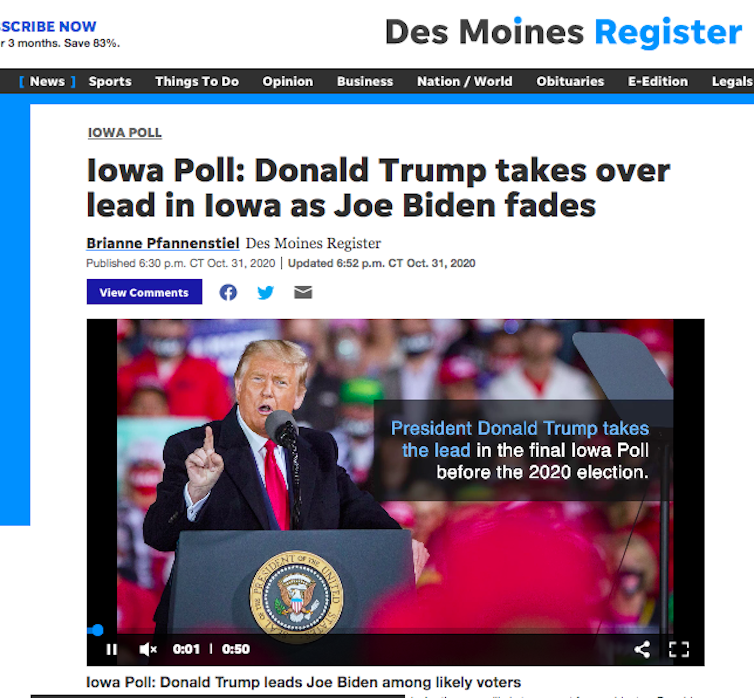We Must Talk About Polling: A Quick Q&A with W. Joseph Campbell
“Epic miscalls and landslides unforeseen: The exceptional catalog of polling failure” is the headline on one of scholar W. Joseph Campbell’s recent stories for The Conversation. Campbell is an authority on the history of presidential polling, and in that story, as well as his recent book, “Lost in a Gallup: Polling Failure in Presidential Elections,” he details just how polls and pollsters – and those who put their faith in them – have misread public opinion when it comes to elections. With that background, we thought that Campbell was an ideal person to provide readers with a critical perspective on 2020’s election polling. He gave us these thoughts late on election night.
Q: You’ve written an entire book about polling failure in U.S. presidential elections. Are there any pollsters this year whose work was notable? Which ones, and why?
It is still too early to say, but at least a few individual polling results were so unusual or unexpected that they stood out in the week or so before Election Day. These included a survey in Wisconsin conducted for The Washington Post and ABC News and released Oct. 28, which pegged Joe Biden ahead by 17 percentage points – an eye-popping margin that no other recent poll even came close to matching. This appears to have been what pollsters call an outlier.
Also standing out was The Des Moines Register’s Iowa Poll, the final results of which were released just days before the election. And they showed President Donald Trump ahead by 7 points in Iowa, which is striking given that the Register’s poll in September indicated the president and Biden were tied. I mention this because the Iowa Poll is highly regarded in the state and beyond.

Another survey result that stirred considerable comment among pundits and some news organizations was a Gallup poll of registered voters that found 56% of Americans said they were better off now than they were four years ago. It’s the highest such percentage Gallup has recorded since first posing the question in 1984.
Given the economic dislocation caused by the COVID-19 pandemic, it is hard to believe that such a large percentage of Americans feel better off compared with four years ago. But maybe they remember how vigorous the economy was until the shutdowns. If that’s the case, the Gallup reading may be an encouraging indicator for Trump.

Q: Where do we stand with exit polling this year? Have early voting and mail-in voting made exit polling a relic of elections past? And can we trust exit polls in any case?
Exit polling has been done this year for a consortium of television networks known as the National Election Pool. But it comes with a twist. Given the popularity of early voting and voting by mail, the polling firm that conducts the consortium’s exit polling, Edison Research, has been interviewing voters at early-voting locations and reaching mail-in voters by phone.
Edison Research also conducted traditional exit polling on Election Day by surveying randomly selected voters as they left voting locations in key precincts around the country.
It is important to keep in mind that exit polls have proved to be misleading in presidential elections, notably in 2004 when they indicated John Kerry was clearly ahead of President George W. Bush – enough so that a senior aide referred to Kerry on election night as “Mr. President.”
Some critics say exit polling could be even less reliable this year, given disruptions caused by the COVID-19 pandemic.
Q: What historical precursors are there for what we’re seeing election night? Does this election remind you of any other in modern times?
Although no two presidential elections are quite the same, the final days and hours of this year’s campaign seemed reminiscent of the race four years ago. Even election night has been at least faintly evocative of 2016. Late in the evening, Trump’s apparent victory in Florida is one example. It was a state crucial to his victory in 2016 and it is vital to his reelection chances.
But Biden may well win the popular vote nationally, as Hillary Clinton did in 2016. On Tuesday morning, Biden had a lead of 7.2 percentage points in national polls, as aggregated by RealClearPolitics.com.
Overall, the election likely will be decided by electoral votes in several closely contested states – much as it was four years ago.
The closely watched states this year include Pennsylvania, Michigan and Wisconsin, which were battlegrounds in 2016.
A surprise of election night 2020 was the unexpectedly tight race in Virginia, which pollsters and pundits regarded as very safe for Biden. A number of news outlets called Virginia for Biden early in the evening, but Trump had maintained a lead in the state well into the night.



























































































